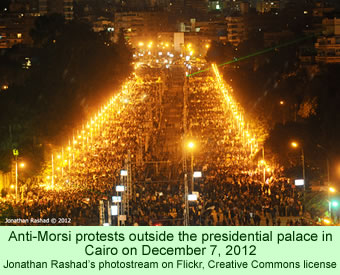The referendum process in Egypt over the country’s new constitution has been as difficult for the Nubians as for the other minority groups that have protested the Muslim Brotherhood steamroller. Voting across the country was divided into two phases, with Cairo, Alexandria, and many of the other cities going to the polls last Saturday, and the rest of the nation, mostly the more rural communities, scheduled to vote this coming Saturday.
The issue has been the preparation, and ratification, of a new, permanent constitution, one which will replace the temporary document prepared shortly after the end of the Mubarak regime. Nubian representatives on the constitution-writing committees have complained bitterly about the lock the Muslim Brotherhood has had on the process and its determination to enact a document that preserves the power of the Islamic party.
Egypt went into crisis mode on November 22 when President Mohammed Morsi decreed that he was above the judicial restraining powers of the Egyptian courts. After massive protests, he rescinded that decree, but his Muslim Brotherhood party decided instead to ram through the finishing touches on the new constitution without further discussion, which they did on November 29 -30. They then decided to get it approved quickly by a referendum.
Huge street protests erupted since Egypt has sizeable minority groups—more than just Nubians—who want to have a nation with legal protections and respect for minorities. Last week, opponents at first favored boycotting the referendum, but they changed their minds and decided to try and organize a “no” vote instead. Haitham Sherdi, a typical opponent in Cairo, said, “this constitution is supposed to protect the rights of the minorities, but it is written by the majority for the majority. If it passes, it will be used to crush the minority until they vanish.”
As Egyptians prepared to vote, the Muslim Brotherhood plastered posers all over the country with a simple message. To vote yes was to protect sharia—Muslim law. In contrast, liberals, leftists, Christians, Nubians, and others who believe in the liberal ideals of guaranteed freedoms argued that the document places the Muslim authorities in positions of control over the legislative process, and denigrates the rights and protections of minorities. It seems to promote control by the Islamists over everyday life.
The referendum process will not be complete until this coming weekend, but it has become clear that the Muslim Brotherhood will probably win, perhaps with a significant majority. According to preliminary results from Egyptian media, 57 percent of the voters on Saturday approved the new document. However, 56 percent of voters in Cairo itself apparently voted “no.”
The predominantly rural areas that will go to the polls on December 22 are likely to vote even more overwhelmingly to approve the new constitution. However, the low turnout—33 percent of qualified voters went to the polls last Saturday—has given the opponents hope that they may yet prevail. However it turns out, the people pulled back from the protests and violence of a few days before the referendum, and many stood quietly for long periods of time at the polling places waiting to cast their ballots.
A reporter, interviewing people standing in polling lines on Saturday, found that while Egyptians are willing to set aside their differences to vote peacefully, they are still bitterly divided, both sides blaming the other for an unwillingness to negotiate.
Many Muslims indicated they voted “no” because they were appalled by the tactics of intimidation used by the Muslim Brotherhood. One man, who had voted for the Islamists in the parliamentary elections last year, said he voted against the new constitution. He was turned off by the violence the government has been using against the protesters in recent weeks.
“What I saw there was savagery,” he said. “They were like monsters with the dragging and the beating. The Islamists have cut Islam to their own measurements, and it is not the Islam we know, a religion of mercy. Now we look like terrorists to the world.”
Through all of the strife, the media have not reported direct violence against the Nubians. The government has reverted to earlier practices used against them by the previous, Mubarak, regime. Early last week, the Prime Minister of Egypt, Hesham Qandil, met with a few members of the Nubian community to discuss some of their concerns.
The prime minister discussed agricultural assistance, land acreage allotments, funding for housing, and other such matters. Prominent leaders of the Nubian cause, such as Fatma Emam, Manal El-Tibi, Mounir Bashir, and others were not informed about the meeting. Manal El-Tibi, a prominent Nubian woman, had resigned from her post on the constitution preparation committee earlier in the year. Mounir Bashir is the Chair of the Egyptian Nubian Association for Lawyers, and Fatma Emam is another prominent Nubian activist.
Mr. Bashir summed up the meeting as a typical example of the way the Mubarak regime always treated the Nubians. “The government meets with a few people and comes up with rash decisions,” he said. The people the government chooses to meet with are essentially token representatives of the Nubian community. Bashir also noted that it was a strange time to hold such a meeting to discuss these Nubian issues. “They are holding this meeting while the country is on fire,” he said. “If this [the street protesting] was not the case, we would have gone to protest such a meeting.”
However the referendum turns out for the Egyptian nation as a whole, it appears as if the Nubian minority may continue to be treated more or less the same as always.
